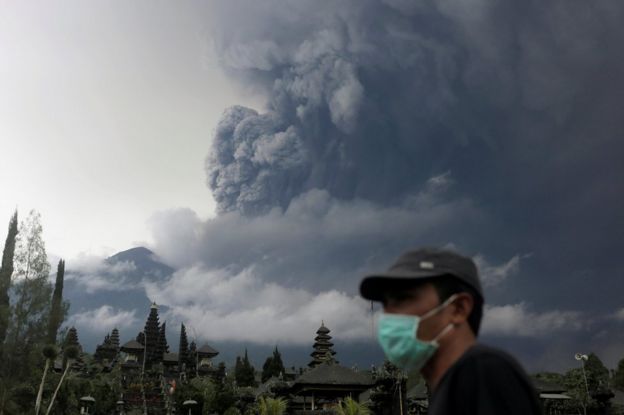Mount Agung: Bali volcano alert raised to highest level
The Indonesian authorities have raised the state of alert on the island to its highest level.
The island's airport has now closed, leaving many stranded in the tourist hotspot destination.
Dark smoke has been seen billowing up to 3,400m (11,150ft) above the mountain's summit.
The National Board for Disaster Management said explosions were being heard 12km (7 miles) from the summit.
Bali's main resorts of Kuta and Seminyak are about 70km (43 miles) from the volcano.
The alert was raised to the level four from 06:00 local time (22:00 GMT) on Sunday, because of "the possibility and imminent risk of disaster".
On Monday the disaster management agency said the volcano was emitting "continuous ash puffs" occasionally accompanied by "explosive eruptions" and a "weak sound of boom".
"The rays of fire are increasingly observed at night. This indicates the potential for a larger eruption is imminent," it said in a statement (in Indonesian) on its Facebook page.
Authorities have been distributing masks for local residents, and have ordered people within a widened 10km (six-mile) exclusion zone to evacuate the area.
The volcano first began belching thick smoke last week - its first eruption in more than 50 years. It has been rumbling ever since.
Bali volcano: What is it like waiting for an eruption?
- Indonesia: Volcano nation
Officials and volcanologists on Saturday confirmed that magma - molten rock - had been detected close to the volcano's surface.
The information director of Indonesia's Disaster Mitigation Agency also tweeted that volcanic ash rain had fallen on the Lombok city of Mataram.
About 25,000 people are thought to still be in temporary shelters after more than 140,000 people fled in recent months.

Authorities first issued warnings of an imminent eruption and raised the alert to the highest level in September after detecting heightened volcanic activity, prompting mass evacuations.
But some islanders returned to their homes in October after the alert level was lowered with a decrease in activity.
According to official estimates, the holiday island lost at least $110m (£83m) in tourism and productivity during that major evacuation.
Indonesia sits on the Pacific "Ring of Fire" where tectonic plates collide, causing frequent seismic and volcanic activity.
It is home to more than 130 active volcanoes. The last time Mount Agung erupted, in 1963, more than 1,000 people died.
[BBC SOURCES]


No comments